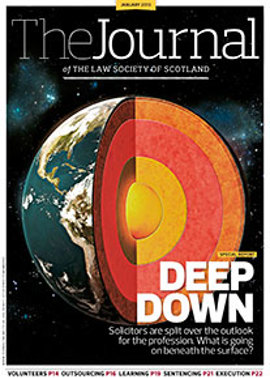Answering for error

Thankfully for conveyancing clients throughout the country, the appeal in McSorley v Drennan [2012] CSIH 59 (10 July 2012) was successful.
The defenders (and appellants) were a married couple who had purchased a house, which they sold on to a third party about a year later. Subsequently, they came to learn that, as a result of the same error of expression having been made in the drafting and revision of the successive dispositions to, and by, them, title to a separate plot of development land had inadvertently been transferred to them, in addition to the house, and, also inadvertently, then transferred to the third party in their conveyance to him.
The original seller, rather than seeking the return of the additional plot from the third party or damages for his solicitors’ negligence, sued the defenders for damages on the premise that they must at some stage have known of the error in the initial disposition to them, and taken advantage of it by transferring title to the additional plot to the third party.
In line with the sheriff’s approach, the sheriff principal held the pursuer’s case relevant on the following basis:
- Though the pursuer did not found on the breach of any contractual term, a relevant case for damages in contract might be made if his loss had arisen “in the broadest sense” out of the contract.
- On the authority of Steuart’s Trustees v Hart (1875) 3R 192 and Angus v Bryden 1992 SLT 884, an error by one party which is known to and taken advantage of by the other, puts the latter in bad faith and is a wrong for which the law provides a remedy.
- As a matter of law, constructive knowledge of the error in the initial disposition had to be imputed to the defenders, on the broad proposition that any prudent purchaser would have satisfied himself as to the actual terms of the title he had bought and the contract therefor, and they were, accordingly, deemed to have known that they had come into title to the additional plot before it was transferred to the third party.
- The pursuer had, therefore, relevantly averred recklessness and bad faith on the defenders’ part at the time of the second disposition.
Unsound approach
The Inner House accepted the detailed written and oral arguments against this approach, advanced on behalf of the defenders. Lords Emslie, Menzies and Wheatley unanimously held, first, that the private law remedy of damages is available only where a party sustains loss through a defender’s breach of some contractual or delictual obligation. In this case, the pursuer disclaimed delict altogether and averred no breach by the defenders of any particular contractual obligation incumbent on them. His pleadings, therefore, identified no legitimate basis for a claim in damages.
Secondly, Steuart’s Trustees v Hart and Angus v Bryden were readily distinguishable on the ground that they concerned the “snatching of a bargain” by unfair means in pre-contractual dealings and the reduction of the resulting contract and subsequent deeds, rather than damages to redress loss arising from events after conclusion of the contract, as sought in this case.
Thirdly, in any case dependent on allegations of deliberate conduct and dishonest wrongdoing (not just fraud), it is essential for a pursuer to make specific and pointed averments. Here, the only averments of knowledge on the defenders’ part referred not to the existence of the error in the initial disposition, but only to the intended scope of the original missives. There were no relevant averments of the defenders’ knowledge of the error prior to the disposition to the third party.
Fourthly, their Lordships rejected as untenable the notion that, as a matter of law, purchasers such as the defenders should be deemed to be aware of the actual terms of their conveyances and entries in the Land Register, whether or not they had seen and understood them. Accordingly, the pursuer had not offered to prove facts from which it could be inferred that the defenders had become aware, before its transfer to the third party, that title to the additional plot had been conferred on them. His case failed the test of relevancy “by a considerable margin”. It ought not to have survived at either stage of proceedings in the sheriff court, and was dismissed.
Obiter, the Inner House was inclined to, but reserved judgment on, the defenders’ further arguments that: (1) the pursuer could have sought return of the additional plot from the third party by reduction of the conveyances and consequent rectification of the Land Register or an ordained reconveyance from him, or, alternatively, rectification of the conveyances and consequent rectification of the register; and (2) that, failing restoration along those lines, the pursuer could have sought recompense in unjustified enrichment under the condictio indebiti from the third party. Alternatively, if he could establish bad faith on the defenders’ part, the pursuer could have sued them for such recompense or for damages in delict. None of those options, however, found any expression in this action.
Comment
The idea that a party could be liable in damages for loss that arises merely “in the broadest sense” out of contract and without causal connection to the breach of a particular term or other contractual or delictual obligation, would, if it had gone uncorrected, have produced serious confusion in relation to all types of contracts. In making clear that, in private law, damages can only be sought where a party’s loss is caused by a defender’s breach of such an obligation, the Inner House did, at least, provide a statement of that fundamental principle, for which there is little direct authority in modern case law.
The Extra Division’s restriction of the doctrine of “error known to and taken advantage of”, from the Steuart’s Trustees v Hart line of authority, to the role only of a vitiating factor arising from conduct in pre-contractual dealings, is also welcome.
The doctrine has always been of doubtful existence and scope. Its erection, by the court below, into “a wrong” that could occur after, and outwith, the conclusion of a contract and could give rise to liability in damages, without the need to establish fraud or negligence as required in relation to a misrepresentation, was always to be deprecated as a confusion of the role of error in contract, delict and unjustified enrichment (see Gloag, Contract (2nd ed), 437-439; McBryde, Contract (3rd ed), 15-30 to 15-33; MacQueen & Thomson, Contract (2nd ed), 4.53-4.55).
Lastly, had it been followed, the effect of the sheriff principal’s decision on constructive knowledge would have been that every purchaser of heritable property, whether a large company or a private individual, would, for the purposes of relations with others, have been deemed to have personally satisfied themselves as to the terms of their missives, disposition and entry in the register.
They would, in effect, have been treated as if they had, personally, obtained all those documents, read them, understood them and then realised the error or other defect in issue, even if they had received no legal advice that might have led them to do any of those things.
That would have created substantial risks for conveyancing clients in many situations, especially “split-off” transactions. A client could have viewed plot/flat X but not plot/flat Y, owned by the same seller, and, although they thought they had bought plot X, technical errors on the conveyancers’ part could, unknown to them, have caused them to come into title to plot/flat Y, instead or in addition.
On the sheriff principal’s reasoning, the client would have been deemed, personally, to know that they had title to plot Y, even if they had never seen the disposition or land certificate, had never occupied or otherwise used that plot, flat or other property or were even aware of its existence. It seems the Inner House accepted that that would just have led to more innocent lay clients unnecessarily having to sit where Mr & Mrs Drennan had to sit in this case: in court.
Thankfully, it rejected the notion as untenable.
In this issue
- Off on the wrong track
- Cadder, EU style
- Common grazing shares – where are we now?
- Is it time to stop baffling our clients/customers?
- Copyright and collaboration: a dose of bad medicine?
- Reading for pleasure
- Opinion column: Ken McCracken
- Book reviews
- Council profile
- President's column
- New build: new process
- Up or down? Digging deeper
- Who volunteers to be discriminated against?
- What's your LPO strategy for 2013?
- Tailored to suit
- Perfect storm less than appealing
- Separate but legal
- In and out of court
- Coming to a court near you
- Which way will the wind blow?
- Entitled to be aggrieved
- Funds less restricted
- Statement or Budget?
- Local leg-up
- Scottish Solicitors' Discipline Tribunal
- Answering for error
- The other alternative
- Remoteness and risk
- Paralegal Scheme extended
- Proposed rule change
- Law reform roundup
- An innocent loan or questionable funds?
- Ask Ash






